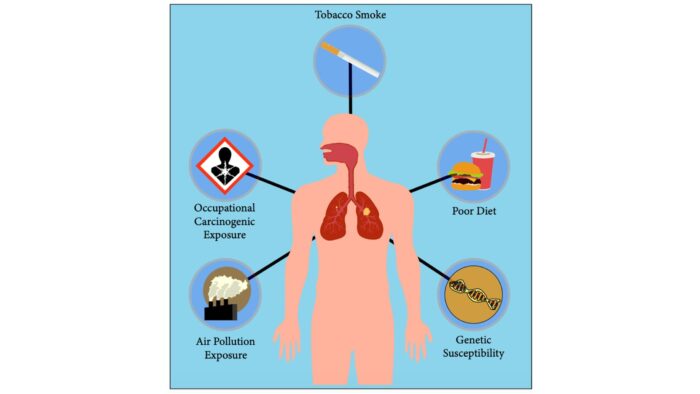BLOG
Non-Small Cell Lung Cancer

Introduction: Non-Small Cell Lung Cancer
Non-Small Cell Lung Cancer (NSCLC) remains a significant health burden globally, including in India. As one of the most prevalent types of lung cancer, NSCLC poses substantial challenges to healthcare systems, patients, and families. In this blog, we delve into the landscape of NSCLC in India, exploring its epidemiology, risk factors, diagnosis, treatment options, and the challenges hindering effective management.
Epidemiology of Non-Small Cell Lung Cancer (NSCLC)in India
Lung cancer, including NSCLC, is a major cause of cancer-related mortality worldwide. In India, the burden of NSCLC is substantial and increasing. According to recent statistics, NSCLC accounts for a significant portion of all lung cancer cases diagnosed in the country. The incidence rates vary across different regions of India, with higher rates reported in urban areas compared to rural areas. Additionally, NSCLC tends to affect males more than females in India, with tobacco smoking being a primary contributing factor
Risk Factors for Non-Small Cell Lung Cancer NSCLC

Understanding the risk factors associated with NSCLC is crucial for prevention and early detection. Tobacco smoking remains the leading cause of NSCLC globally, including in India. However, exposure to environmental pollutants, such as air pollution and occupational hazards like asbestos and radon, also contributes to the risk of developing NSCLC. Moreover, genetic predisposition and lifestyle factors, such as diet and physical activity, play significant roles in determining an individual's susceptibility to NSCLC
Diagnosis of NSCLC
Early diagnosis is essential for improving the prognosis and survival rates of NSCLC patients. In India, the diagnosis of NSCLC typically involves a combination of imaging techniques, such as chest X-rays, computed tomography (CT) scans, and positron emission tomography (PET) scans, along with histopathological examination of tissue samples obtained through biopsy. Molecular testing for specific genetic mutations, such as EGFR and ALK alterations, has become increasingly important in guiding treatment decisions for NSCLC patients.
Treatment Options for NSCLC
The management of NSCLC requires a multidisciplinary approach tailored to individual patient characteristics and disease stage. Treatment options for NSCLC in India include surgery, chemotherapy, radiation therapy, targeted therapy, and immunotherapy. Surgical resection is often considered for early-stage NSCLC patients who are candidates for curative intent treatment. For advanced or metastatic NSCLC, systemic therapies, such as chemotherapy and targeted therapy directed against driver mutations like EGFR and ALK, have shown significant efficacy in improving patient outcomes. Additionally, immunotherapy drugs, such as immune checkpoint inhibitors, have emerged as a promising treatment modality for NSCLC, particularly in patients with PD-L1 expression.
Challenges in Managing NSCLC in India:
Despite advancements in NSCLC diagnosis and treatment, several challenges persist in effectively managing the disease in India. Limited access to healthcare facilities, especially in rural areas, delays diagnosis and treatment initiation for many NSCLC patients. Additionally, socioeconomic factors, including poverty and lack of health insurance coverage, often pose barriers to accessing expensive cancer treatments. The stigma associated with lung cancer and misconceptions about its causes further impede efforts to raise awareness and promote early detection among high-risk populations. Moreover, the shortage of trained oncology specialists and resources exacerbates the burden of NSCLC care in India
These Medicine Uses For Non-Small Cell Lung Cancer
Afanat 40mg Tablet
Please, take this medicine after Doctor’s advice only
Progress and Future Directions:
Despite the challenges, significant progress has been made in the diagnosis and treatment of NSCLC in India. Advances in molecular testing technologies have enabled more precise identification of targetable genetic alterations, leading to the development of personalized treatment strategies. Moreover, efforts to improve cancer awareness and screening programs, coupled with initiatives aimed at strengthening healthcare infrastructure and expanding access to affordable cancer care services, hold promise for reducing the burden of NSCLC in India. Collaborative research efforts and clinical trials exploring novel therapeutic approaches, including combination therapies and immunomodulatory agents, offer hope for further improving outcomes for NSCLC patients in the country.
Conclusion:
Non-Small Cell Lung Cancer remains a significant public health challenge in India, requiring concerted efforts from healthcare providers, policymakers, and society as a whole to address effectively. By promoting awareness, facilitating early detection, expanding access to quality cancer care, and investing in research and innovation, India can make significant strides in combating NSCLC and improving outcomes for affected individuals and their families. Together, we can strive towards a future where NSCLC is no longer a leading cause of cancer-related morbidity and mortality in India.

